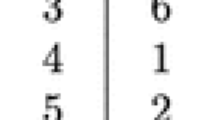Abstract.
This paper focuses on the fair division of a set of indivisible items between two people when both have the same linear preference order on the items but may have different preferences over subsets of items. Surprisingly, divisions that are envy-free, Pareto-optimal, and ensure that the less well-off person does as well as possible (i.e., are equitable) can often be achieved. Preferences between subsets are assumed to satisfy axioms of qualitative probability without implying the existence of additive utilities, which is treated as a special case. Algorithms that render fair division practicable are proposed, and their vulnerability to strategic manipulation is investigated.
Similar content being viewed by others
Author information
Authors and Affiliations
Additional information
Received: 18 May 1998/Accepted: 2 March 1999
Rights and permissions
About this article
Cite this article
Brams, S., Fishburn, P. Fair division of indivisible items between two people with identical preferences: Envy-freeness, Pareto-optimality, and equity. Soc Choice Welfare 17, 247–267 (2000). https://doi.org/10.1007/s003550050019
Issue Date:
DOI: https://doi.org/10.1007/s003550050019




